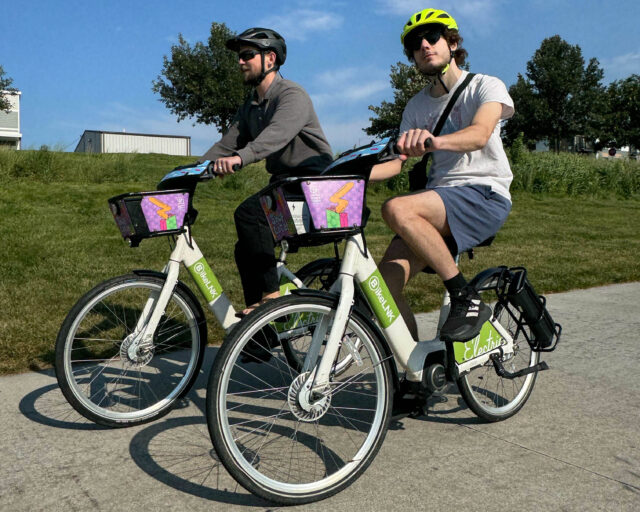How Partnerships With Community Organizations Benefit Bike Share
by Odochi Akwani, Writer and Content Manager
October 24, 2024
BikeLNK in Lincoln, Nebraska, partnered with local nonprofits to directly reach transportation-insecure communities through bike share.

ROAM Share, a nonprofit that oversees three bike share systems in Nebraska, including Lincoln’s BikeLNK, has always made equitable programming a priority. With BikeLNK’s Equity Program entering its third season, the bike share operator made some changes to continue offering the program while combating bike misuse, as its previous library pass model experienced lost or stolen bikes.
“We collaborated this year to create something that held users with a little bit more accountability, but was still a serious asset to anybody who was experiencing transportation insecurity,” says BikeLNK city manager Hunter Arias.
Through funding from The Cooper Foundation, the 2024 BikeLNK Equity Program offered a total of 150 passes at a free or reduced cost — including 75 free day passes and 75 year-long passes for $5. Users must enter a valid credit card and phone number when signing up for this program, allowing BikeLNK to understand bike usage and needs for future programming. It also allows BikeLNK to reach out to users if bikes aren’t being used properly.
These equity passes are distributed to seven nonprofits across Lincoln that work with a variety of communities: RISE, Catholic Social Services of Southern Nebraska, Asian Cultural and Community Center, F Street Community Center, Malone Center, El Centro de las Américas, and StarTran. About 30% of all passes have already been distributed since the program began in August.
To assist unbanked community members with accessing the equity pass, Catholic Social Services of Southern Nebraska (CSS) purchased prepaid debit cards.
“We were experiencing difficulty in distributing the passes because of the barriers that exist with utilizing a platform that relies on digital, financial, and other access points,” says CSS director of sustainability Jamie Carson.
To address these barriers, CSS purchases the prepaid debit cards which community members can then use as their credit card. CSS staff members also help users input their contact information, and if they do not have a physical address, the CSS address is used to mail the fob which provides access to the bikes. Before a CSS client starts using BikeLNK, CSS shows them the system’s educational videos for the new rider to “feel empowered to jump right on the bike seat and utilize it,” says Carson.
CSS identifies community members who could benefit from the equity pass based on the intake process and knowing their clients on an individual basis and what their needs are. This kind of personal partnership ensures the passes go directly to those who need them most.
“This allows us the opportunity to build and form connections with people who care about Lincoln, because these are all local Lincoln nonprofits,” says Arias. “It’s a great community-building opportunity that’s going to get more adults beyond college on bikes.”
